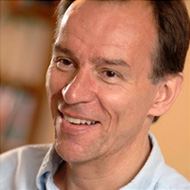Jon Turney
Jon Turney has been a science writer, editor, and reviewer since the early 1980s, with spells as a journalist, academic, and publisher.
He now mainly writes books, and takes on other freelance commissions which are interesting or lucrative enough to divert him from that, or get him out of the house. His latest book is The Rough Guide to the Future.
Jon edited Medicine and Health Science Trends, coedited A Quark for Mister Mark: 101 Poems About Science (Faber poetry), and authored Lovelock and Gaia: Signs of Life, Physics (Hutchinson Trends in Science), and Frankenstein’s Footsteps: Science, Genetics, and Popular Culture.
He has lectured widely and created and taught science communication courses in several universities. And he has always enjoyed helping other people get their ideas into shape — whether through book editing, report writing, conference summaries, or consultancy.
Jon has an enduring fascination with social research related to science and technology (his own main academic study once upon a time) and in the way it informs the wider social conversation about science.
He enjoys writing and editing on assignment, especially around life science, science and society, and policy issues. He’d be happy to do some for you, too. A recent satisfied customer said: “You have done a masterful job of bringing together the day’s programme in a coherent piece of engaging writing. Thank you”. (Karen Goldie-Morrison, Chief Executive, Charles Darwin Trust, March 2005)
He has also edited a range of books, including Icon Books Revolutions in Science Series. And while at Penguin, and since then as a consulting editor, he has had a hand in editing books by (in no particular order) Brian Greene, Jared Diamond, Michio Kaku, John Gribbin, Jim Baggott, Peter Smith, and David Rothenberg. He also edits academic papers on occasion (though he cannot improve your data, he may be able to help with the presentation).
Just now Jon is working on a large project for the British Heart Foundation in connection with their 50th anniversary next year, but ought to be done with that soon. Then he will begin planning another book.
Read Can science fiction be lab lit? The scientific profession through the lens of fiction. He blogs about futures and forecasting, and you can follow him on twitter. Read his LinkedIn profile. Visit his Facebook page.
